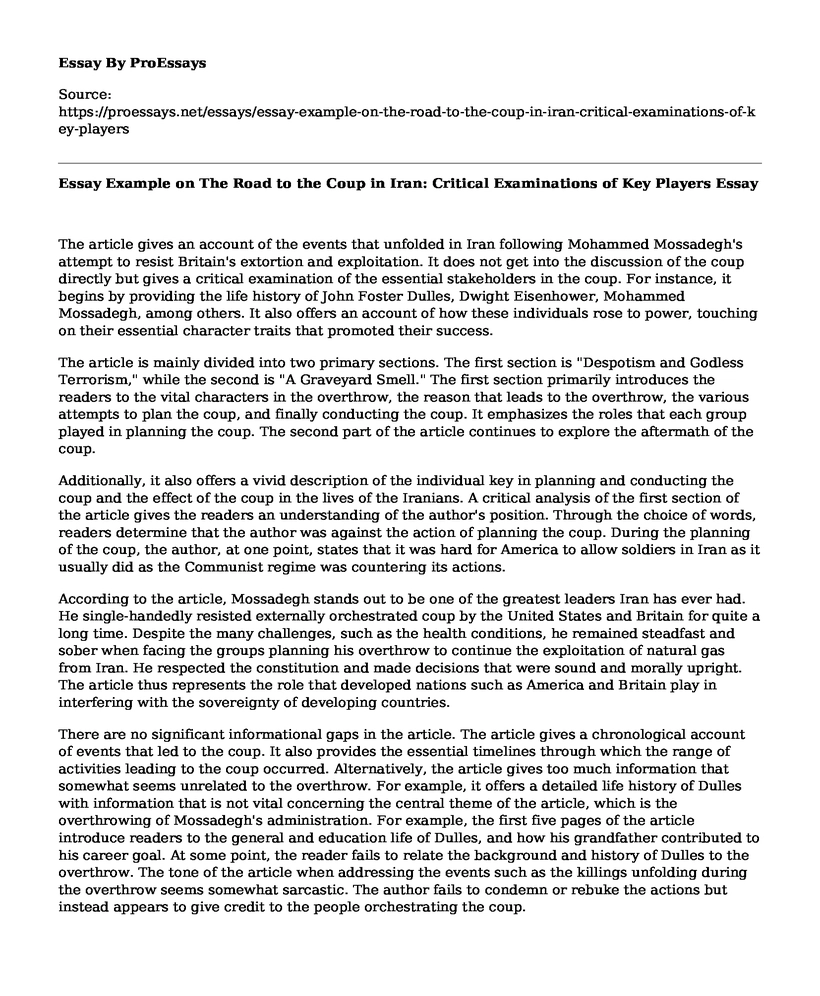The article gives an account of the events that unfolded in Iran following Mohammed Mossadegh's attempt to resist Britain's extortion and exploitation. It does not get into the discussion of the coup directly but gives a critical examination of the essential stakeholders in the coup. For instance, it begins by providing the life history of John Foster Dulles, Dwight Eisenhower, Mohammed Mossadegh, among others. It also offers an account of how these individuals rose to power, touching on their essential character traits that promoted their success.
The article is mainly divided into two primary sections. The first section is "Despotism and Godless Terrorism," while the second is "A Graveyard Smell." The first section primarily introduces the readers to the vital characters in the overthrow, the reason that leads to the overthrow, the various attempts to plan the coup, and finally conducting the coup. It emphasizes the roles that each group played in planning the coup. The second part of the article continues to explore the aftermath of the coup.
Additionally, it also offers a vivid description of the individual key in planning and conducting the coup and the effect of the coup in the lives of the Iranians. A critical analysis of the first section of the article gives the readers an understanding of the author's position. Through the choice of words, readers determine that the author was against the action of planning the coup. During the planning of the coup, the author, at one point, states that it was hard for America to allow soldiers in Iran as it usually did as the Communist regime was countering its actions.
According to the article, Mossadegh stands out to be one of the greatest leaders Iran has ever had. He single-handedly resisted externally orchestrated coup by the United States and Britain for quite a long time. Despite the many challenges, such as the health conditions, he remained steadfast and sober when facing the groups planning his overthrow to continue the exploitation of natural gas from Iran. He respected the constitution and made decisions that were sound and morally upright. The article thus represents the role that developed nations such as America and Britain play in interfering with the sovereignty of developing countries.
There are no significant informational gaps in the article. The article gives a chronological account of events that led to the coup. It also provides the essential timelines through which the range of activities leading to the coup occurred. Alternatively, the article gives too much information that somewhat seems unrelated to the overthrow. For example, it offers a detailed life history of Dulles with information that is not vital concerning the central theme of the article, which is the overthrowing of Mossadegh's administration. For example, the first five pages of the article introduce readers to the general and education life of Dulles, and how his grandfather contributed to his career goal. At some point, the reader fails to relate the background and history of Dulles to the overthrow. The tone of the article when addressing the events such as the killings unfolding during the overthrow seems somewhat sarcastic. The author fails to condemn or rebuke the actions but instead appears to give credit to the people orchestrating the coup.
The article, through the actions of Dulles and his British counterparts, portrays the United States and Britain as countries that take advantage of developing countries. Dulles and the British counterparts fail to understand why a small country like Iran would stop them from exploiting natural oil. However, the case is not always valid. Although some leaders in the United States and Britain have acted out of corruption and greed, the countries have been on the frontline in promoting peace, especially in the Middle East and help in times of natural catastrophic events.
Two Discussion Questions Related to the Reading
Is it morally or politically right for developed nations to interfere with the sovereignty of small developing countries?
Was the overthrow planned by the United States and Britain in Iran on Mossadegh's administration justified.
Cite this page
Essay Example on The Road to the Coup in Iran: Critical Examinations of Key Players. (2023, Apr 18). Retrieved from https://proessays.net/essays/essay-example-on-the-road-to-the-coup-in-iran-critical-examinations-of-key-players
If you are the original author of this essay and no longer wish to have it published on the ProEssays website, please click below to request its removal:
- The Obama Care Act and Constitution Case Study
- Accountability and Control in Government Accounting Systems
- Essay Sample on Interventions to Stop ISIS
- Nixon and Obama Contribution to Humanities Paper Example
- Foreign Policy - Essay Sample
- Essay Sample on The Constitution: Executive Powers & Roles
- Essay on 1800s US Presidential Election: John Adams vs Thomas Jefferson







